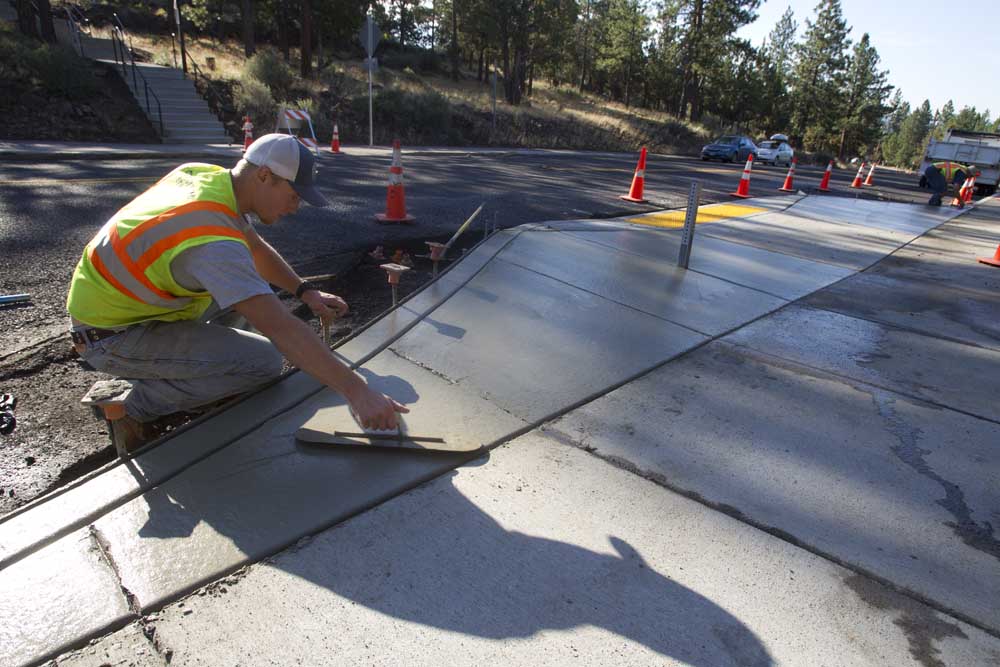DOJ closes case on Bend
Published 12:00 am Thursday, July 24, 2014

- Andy Tullis / The BulletinCity of Bend employee Josh Lessar, left, works with other employees to install a new curb ramp on NW College Way near the Mazama Gym on the Centarl Oregon Community College campus in Bend.
The U.S. Department of Justice announced Wednesday that it closed the case against the city of Bend for violations of the Americans with Disabilities Act, despite a backlog of work the city has yet to complete.
The DOJ informed the city of the decision in letter emailed Wednesday, more than six months before the deadline for the city to complete work it agreed to do under a 2004 federal settlement with the Justice Department. Bend officials have repeatedly said they expect to miss the deadline.
“Relying upon the evidence submitted by the city thus far, the department is now satisfied that your city has acceptably progressed in compliance with the settlement agreement, and we are, therefore, closing our files on this review as of the date of this letter,” the DOJ wrote.
“However, the city’s obligation to complete all remaining remedial actions within the agreed-upon time frame remains.”
City councilors said the news is an indication the city is making progress on the work, but they also said Bend will continue to fix sidewalks and other infrastructure problems that make parts of the city inaccessible to people with disabilities. The settlement agreement resulted from a complaint that four Bend residents filed with the Department of Justice in 2001. On Wednesday, the original complainants did not respond to a request for comment.
Carol Fulkerson, a volunteer disability and accessibility advocate and a member of the Central Oregon Coalition for Access steering committee, said Wednesday night that she was shocked to hear of the DOJ decision. Fulkerson said that in other communities, the DOJ has renegotiated settlement agreements and continued its oversight when communities missed deadlines. She expected something similar in Bend.
“I imagined there might be some continued oversight by the Department of Justice,” Fulkerson said. “This decision means that advocates and people with disabilities have to work that much harder to achieve their civil rights.”
Assistant City Attorney Gary Firestone said according to his interpretation of the DOJ letter, the city must complete the work it promised to do in its latest three-year work plan submitted to the Justice Department earlier this year.
During the next three years, the city will fix only a fraction of the sidewalk curbs that still lack ramps, or have ramps that do not meet accessibility standards, according to the work plan. Bend has 7,149 curb ramps, of which more than half — 4,891 — were still out of compliance with the ADA when the city drafted the latest plan. City employees expect to add more than 1,000 accessible curb ramps during the next three years, if funding for the work continues at the current level. The city expects to build more than 2 miles of accessible sidewalk during the same period, according to the document known as a transition plan.
Karin Morris, the city of Bend accessibility manager, said the DOJ letter came as a surprise to her, although she said it is not unusual for the DOJ to close cases.
“It is one avenue that they do,” Morris said. “I don’t see us changing our path. We will continue to improve and continue working on accessibility.”
A majority of the City Council said the DOJ decision does not mean the city is done improving sidewalks and other infrastructure necessary to make the community accessible to everyone. Mayor Pro Tem Jodie Barram said Wednesday evening that the city will continue to do the work it outlined in the latest plan.
“It means we’re going to keep working,” Barram said of the DOJ letter. “I think we’re going to keep working with the advocates that are monitoring this and brought it up … Everything’s going to continue going forward, like we planned.” Mayor Jim Clinton did not respond by deadline Wednesday night, and City Councilor Doug Knight declined to comment.
City Councilor Scott Ramsay agreed with Barram. “Bottom line is it gives us a little more flexibility, but I’m sure there’s a commitment to stay on track with fulfilling our prior obligation,” Ramsay said.
City Councilor Sally Russell said she interprets the letter as an indication the city is on a better path toward accessibility than in previous years.
“I think the culture at the city has changed significantly since that lawsuit was filed,” Russell said. “I see no reason why the city won’t continue to follow the plans that it already has in place, and I would certainly expect and hope and think they’ll become more robust as we move into the future.”
Russell said the city is increasingly focusing on the sidewalks and other infrastructure necessary to make Bend more accessible for all citizens, as planners work on infill and redevelopment of some areas and look ahead to the increase in students that will accompany the new OSU-Cascades campus.
City Councilor Victor Chudowsky said the DOJ letter means the “legal pressure is off, and I’m glad we cleared that milestone.” However, Chudowsky said, “It doesn’t mean we’re absolutely finished with everything we need to do. For example, I think we should keep on the position of the ADA coordinator because it’s not something where we finish the job and then our responsibilities are done. It’s more that thinking about people with disabilities needs to be embedded in everything the city does.”
City Councilor Mark Capell said the DOJ letter does mean the city’s work will no longer be supervised, “so we have to make sure we do the right thing.”
— Reporter: 541-617-7829, hborrud@bendbulletin.com






